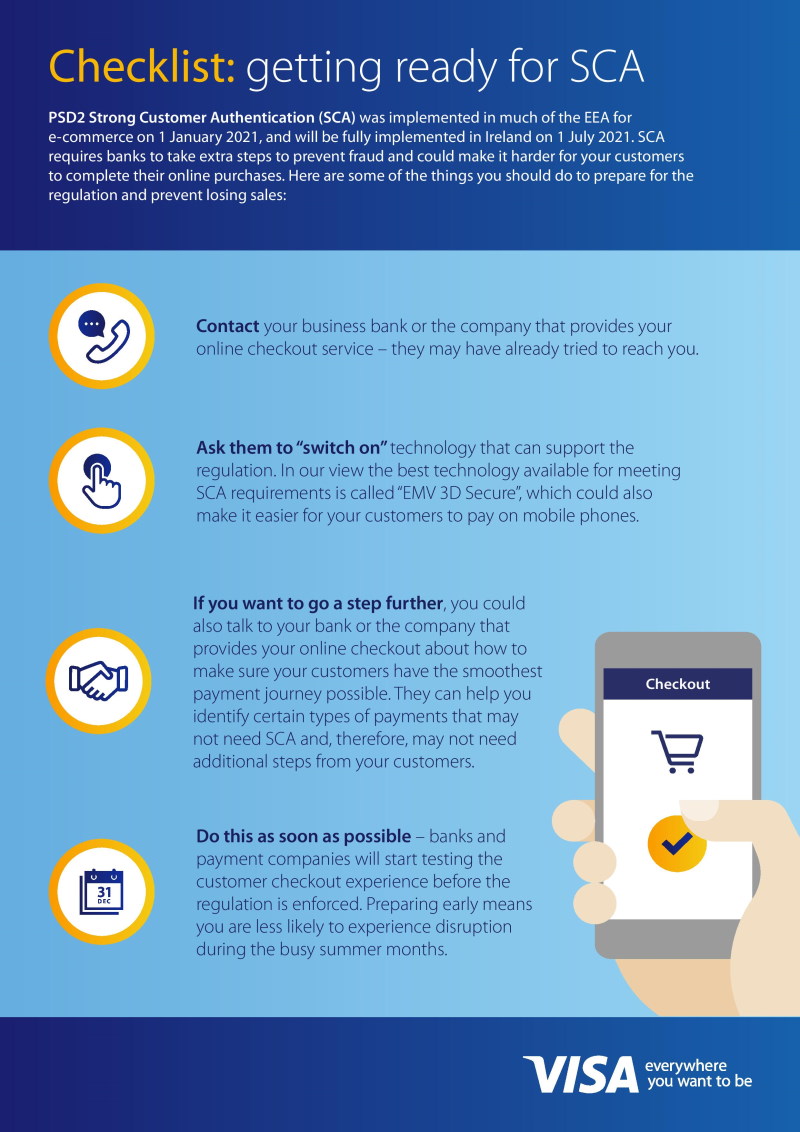Making sure your customers can still buy from you online

The past year has changed our expectations and use of e-commerce. Many businesses not only in Ireland but all around the world have had to shut their doors in response to the pandemic. Those that have managed to stay afloat have needed to adjust their business models – with many finding a lifeline in being able to sell online. Likewise, many consumers who had previously preferred to shop in-store have embraced online shopping as a way to buy essentials, stream their favourite films, and send gifts to loved ones.
With experts predicting that these changes in shopping behaviour are permanent, it is crucial that it remains easy to buy and sell online. That said, a new European regulation will be enforced from 1 July in Ireland this year, which, if not adhered to, could make it harder for customers to pay at online checkouts. Here at Visa, we have been working with banks and companies across the payments industry to help ensure payments can still easily be made. But there are steps you must take to ensure customers can still buy from your website once the regulation kicks in.
The new rules
Strong Customer Authentication (SCA) – part of a broader payments regulation known as PSD2 – requires banks to perform additional checks to ensure that a customer is the correct cardholder (and not a fraudster) when making a purchase. The aim of the regulation is to reduce fraud – making e-commerce more secure, and helping consumers to feel more confident as they shop online. However, this process could also mean the shopper needs to take additional steps during checkout – no doubt impacting their payment experience. Furthermore, payments that don’t meet the requirements set out by SCA, may be declined by banks.
Knowledge is power
You have some power to decide how smooth the checkout experience will be for your customers, and ensure legitimate payments can be approved.
We believe the best way to make sure your customers’ payments support the regulation is to add a piece of technology to your checkout called 3-D Secure (3DS). Delivered by EMVCo, this technology scans payments as they come through to determine if they seem likely to be fraudulent, and enables banks to ask the customer for more proof of their identity (in line with the regulation).
If you want to make sure your checkout is as smooth as possible, we believe you should use the latest version of this technology, called “EMV 3D Secure”. This version of the technology gives banks more information on a payment, and is more suited to modern tech devices, such as mobile phones and home assistants. Our data shows that when 3DS has been applied, e-commerce fraud can be reduced by half1. What’s more, the fact that implementing 3DS means banks can verify the identity of their cardholder at checkout means that, if fraud does take place, your business could benefit from liability protection. Finally, keeping your online sales secure and avoiding fraud losses could have a positive impact on your profitability.
Implementing it is easy: the company that enables your website to take payments/runs the checkout section of your website – it could be your business bank or a payment gateway, for instance – should be able to “switch on” this technology. That said, this will not happen automatically, so if you want to use 3DS, you must ask.
Identifying every exemption
Once you’ve implemented the technology to deliver SCA, the next way to minimise disruption for your customers is to try and reduce the number of payments that require further steps at checkout at all. Not every online payment requires SCA – it includes exemptions, and there are some payments that are “out of scope” – where the regulation doesn’t apply. Working with your bank or gateway, you can indicate if a customer’s payment falls under an exemption, and ensure it passes directly through for bank approval.
One exemption, for instance, is that additional checks are not always required for “low value” payments. If many of the products and services you sell are for less than €30, it is worth mentioning this to your bank or gateway.
Challenge or opportunity
Whatever the size of your business, you can be certain that if you sell online in Ireland and/or within the EEA and/or the UK, your customers will, at some point, go through additional checks including needing to provide stronger proof of their identity in line with SCA. To make sure they can, contact the company or bank that provides your website checkout service.
For many businesses SCA could present an opportunity. With the right preparation, you can reduce fraud and ensure your hard-earned customers can still pay you easily and quickly.

For an accessibility friendly version of this infographic, click here.
1 Visa 3D Secure data